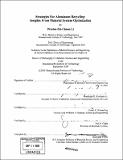| dc.contributor.advisor | Randolph E. Kirchain, Jr. and Lionel C. Kimerling. | en_US |
| dc.contributor.author | Li, Preston Pui-Chuen | en_US |
| dc.contributor.other | Massachusetts Institute of Technology. Dept. of Materials Science and Engineering. | en_US |
| dc.date.accessioned | 2006-07-31T15:16:58Z | |
| dc.date.available | 2006-07-31T15:16:58Z | |
| dc.date.copyright | 2005 | en_US |
| dc.date.issued | 2005 | en_US |
| dc.identifier.uri | http://hdl.handle.net/1721.1/33611 | |
| dc.description | Thesis (Ph. D.)--Massachusetts Institute of Technology, Dept. of Materials Science and Engineering, 2005. | en_US |
| dc.description | Includes bibliographical references (p. 181-185). | en_US |
| dc.description.abstract | The dramatic increase in aluminum consumption over the past decades necessitates a societal effort to recycle and reuse these materials to promote true sustainability and energy savings in aluminum production. However, the path towards this goal is full of challenges which lead to inefficiencies in the usage of secondary materials. These frictions are due to (i) rapidly changing consumption patterns, (ii) compositional incompatibility in scrap streams and (iii) incomplete information in the decision making process around scrap consumption. This thesis tackles these inefficiencies by developing optimization-based decision tools and modeling techniques for the assessment of sorting technologies and scrap management from procurement to production. In the course of managing and accounting for the aforementioned variability and uncertainties in the material system inputs, the goal is to present cost-effective strategies to increase scrap consumption under applicable context of different operating environment in aluminum production. These decision tools also aim to foster a fundamental shift in decision-making behavior to factor in uncertainties into the scrap management process. | en_US |
| dc.description.abstract | (cont.) A sorting algorithm with an arbitrary number of output streams is created as a guide to quantify the effects of wrought and cast recovery rates, sorting cost, scrap content, and product mix on sorting technologies application and development. In collaboration with Norsk Hydro Aluminum, an evaluation of wrought-versus-cast sorting technology is undertaken. For a reasonable range of sorter recovery rates and costs, the process leads to overall cost savings and increase in scrap consumption. Unlike cost savings and scrap consumption, however, the sorter utilization rate does not increase monotonically with improvements in recovery rates. Furthermore, under limited scrap supplies, not all products benefited in increased scrap consumption with sorting. Stochastic optimization techniques are introduced to address demand and scrap compositions uncertainties faced by different decision-makers along the aluminum production chain. With the idea of recourse and scrap net residual value, increased scrap purchase and usage were determined to be an effective hedge against adverse demand swings. Traditional forecast-based deterministic decision tools were found to be too costly and conservative in scrap usage on average. | en_US |
| dc.description.abstract | (cont.) At the operator level, stochastic modeling draws relevance in its ability to link production tolerance level for compositional variance to the underlying compositional uncertainties in scrap materials. The technique also supports diversification in scrap sources as a way to mitigate compositional variance in product scrap usage. Overall these models and methodologies target various scrap usage inefficiencies in the aluminum production chain. Their application and associated insights can bring society one step closer towards sustainable development, not only in aluminum, but potentially for other light metals as well. | en_US |
| dc.description.statementofresponsibility | by Preston Pui-Chuen Li. | en_US |
| dc.format.extent | 185 p. | en_US |
| dc.format.extent | 10020117 bytes | |
| dc.format.extent | 10027896 bytes | |
| dc.format.mimetype | application/pdf | |
| dc.format.mimetype | application/pdf | |
| dc.language.iso | eng | en_US |
| dc.publisher | Massachusetts Institute of Technology | en_US |
| dc.rights | M.I.T. theses are protected by copyright. They may be viewed from this source for any purpose, but reproduction or distribution in any format is prohibited without written permission. See provided URL for inquiries about permission. | en_US |
| dc.rights.uri | http://dspace.mit.edu/handle/1721.1/7582 | |
| dc.subject | Materials Science and Engineering. | en_US |
| dc.title | Strategies for aluminum recycling : insights from material system optimization | en_US |
| dc.type | Thesis | en_US |
| dc.description.degree | Ph.D. | en_US |
| dc.contributor.department | Massachusetts Institute of Technology. Department of Materials Science and Engineering | |
| dc.identifier.oclc | 64387635 | en_US |
